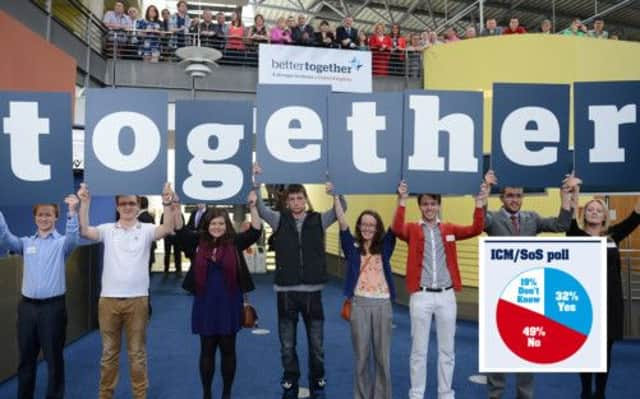Analysis: Poll leaves independence vote in balance


Our poll suggests it is above that psychologically important figure.
Indeed, once we strip out the don’t knows and the won’t says, our poll points to a Yes vote of 40 per cent, with 60 per cent saying No. While that means No are well ahead it also means the crucial 50 per cent mark does not look entirely out of the Yes side’s reach.
Advertisement
Hide AdAdvertisement
Hide AdMoreover our poll points to one way in which Yes Scotland might hope to close the gap – by appealing to those who say they intend to vote No but would also like to see a lot more devolution.
No less than 41 per cent of those who currently say they expect to vote No would like the Scottish Parliament to be primarily responsible for taxation and welfare benefits in Scotland, that is “devo max”. And of this group of current No voters, over one in four say they might vote Yes or are uncertain what they would do if they were to come to the conclusion that the Scottish Parliament would not in fact get any more powers in the event of a No vote.
If these voters were to switch sides – or in the case of those who are unsure what they would do, abstain – then the Yes vote would increase from 40 per cent to 45 per cent. Although making a successful appeal to “devo maxers” may not be sufficient to take Alex Salmond across the winning line, it could take him half way there.
Meanwhile, for the No side the good news is that the suggestion made by another poll, commissioned by the SNP, that the Yes side might actually be narrowly ahead now very much looks like pie in the sky – neatly baked by posing some potentially leading questions before asking people how they proposed to vote.
At the same time, Better Together will note that the Yes vote appears to be softer than their own. No less than 29 per cent of those who currently say they will vote Yes admit they might yet change their mind. In contrast, just 16 per cent of No voters make the same admission. If just half of those uncertain Yes voters were to switch sides then Alex Salmond and his colleagues could lose by as much as two to one, a result that could see their hopes of independence kicked into some very long grass indeed.
Yet at the moment at least, both sides are struggling to make much impression on the balance of public opinion. The 60:40 reading in today’s poll is virtually identical to the average across all of the polls conducted as much as a year ago. The challenge facing both sides during the next 12 months is to find the decisive argument that so far has eluded them.
• John Curtice is Professor of Politics at Strathclyde University and Chief Commentator at www.whatscotlandthinks.org